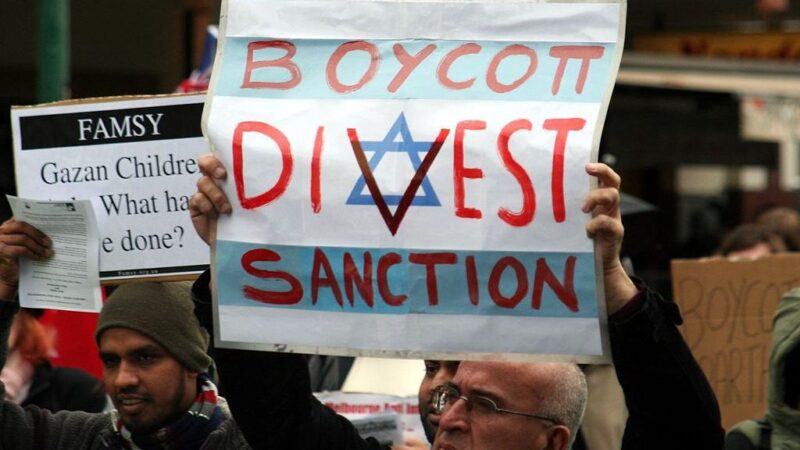“Is Holding Israel to a ‘Higher Standard’ Anti-Semitic?”
By Barry Shapiro
Israel tends to serve as a proxy for the U. S., and for the West in general, in ways that no other human rights violator is able to serve.
In the ongoing debate as to whether or not hostility toward Israel inevitably carries with it overtones of anti-Semitism, it would seem, at least at first glance, that the most persuasive argument of those inclined to perceive anti-Semitism as inherent in such hostility is the assertion that Israel is being held to some kind of “higher” or “double” standard. According to this line of reasoning, Israel is, of course, far from perfect and has indeed carried out and is carrying out numerous regrettable policies and actions, but what about the countless examples of equally egregious or far worse atrocities which never get the attention that is devoted, especially in progressive circles and on the political left, to Israeli treatment of Palestinians? What about the Chinese in Tibet or the systematic violation of Kurdish human rights by the Turks? What about genocidal mass murder in Darfur or in the Democratic Republic of Congo? Why so much hand- wringing reserved for the crimes and misdemeanors of the Jewish state?
Speaking to these questions in the wake of the April 2018 endorsement of the Boycott, Divestment, and Sanctions campaign by Barnard College students, Jewish Forward journalist and Barnard alumna Jenny Singer wrote that “college students who devote themselves to demonizing and delegitimizing Israel with a single-minded rabidity they show for no other issue truly are struggling with anti-Semitic impulses.” Let us, for purposes of this essay, take the rather vague and imprecise term “anti-Semitic impulses,” in the widest possible sense as referring to a broadly conceived brew of conscious, semi-conscious, and unconscious sentiments, feelings, and/or opinions. With this mind, let us concede that hostility towards Jews and/or Jewishness in some form is not entirely absent in fomenting anti-Israeli sentiment among progressives, including among the heavily Jewish Barnard students referenced by Singer.
This essay, however, will seek to present an alternative explanation for why progressives, and in particular Jewish progressives, seem to train such a disproportionate amount of their political ire at the so-called “only democracy in the Middle East.” In thus focusing on liberal and progressive condemnations of Israel, we will not be concerned here, it should be noted, with Arab and Muslim condemnations of Israel or with anti- Israel sentiments expressed by “classical” neo-Nazi-style anti- Semites. (Anti-Israel sentiment among Arabs and Muslims can be differentiated from anti-Israel sentiment among “classic” anti-Semites in that for the latter, hatred of Jews is clearly primary, serving as the source of whatever anti-Israel sentiment may be expressed, whereas for the former, anti-Israel animus is, at least in many cases, the primary source for anti-Semitism.) To reiterate, it is the disproportionate criticism seemingly leveled at Israel by progressives, especially by progressive American Jews, that will be at issue here.
The logic which implicitly seems to be behind the conflating of anti-Israel and anti-Semitic sentiment is set forth in a particularly stark and extreme manner in an op-ed by David Suissa in the Jewish Journal (May 29, 2019): “If you hate Jews so much that you want to challenge their very presence, your best bet is to go after Israel. Jew haters know they can’t start a movement to eliminate the Jews, so they do the next best thing: They work to undermine, in sneaky ways, the world’s only Jewish state.” Or as Malcolm Hoenlein, executive vice chairman of the Conference of Presidents of Major Jewish Organizations, put it: The politically correct way to be anti-Semitic is not to say, ‘I hate the Jews,’ but to say, ‘I hate Israel.”’2
Contrast, however, the “strategy” described by Hoenlein and Suissa with the testimony provided by two Jewish-American historians in explaining their changing views on Israel, in a Ha’aretz opinion piece in August, 2016. “The Israel that I loved,” writes Hasia Diner, “the one my parents embraced as the closest approximation to Eden on earth, itself had depended well before 1967 upon the expropriation of Arab lands and the expulsion of Arab populations. The Law of Return can no longer look to me as anything other than racism. I abhor violence, bombings, stabbings, or whatever hurtful means oppressed individuals resort to out of anger and frustration. And yet, I am not surprised when they do so, after so many decades of occupation, with no evidence of progress.” Or as Marjorie Feld states: “In all facets of my very Jewish upbringing I was immersed in Holocaust education. It was made absolutely clear to me that only Israel could prevent the concentration camps, right-wing anti-Semitism, and genocide, from reappearing. Friends and I travelled throughout Israel on a summer high school program in 1988, hitting the Jewish tourist spots (Masada, the Western Wall) that reinforced both Jewish nationalist triumphalism and the co-constitutive invisibility of Palestinians, their history, the violence and ethnic cleansing that created the Jewish state. I now call it my propaganda tour, but I learned this language only later.”
Though not as immersed in a Zionist or even a strongly Jewish upbringing as Diner and Feld, I too grew up with an idealized view of Israel as a proverbial “light unto the nations,” as somehow different and in particular more ethical and just than other countries, including an America whose warts were becoming particularly evident during the civil rights/Vietnam era. Like so many other American Jews of the time, I thrilled to the exploits of Ari Ben Canaan (that is to say, Paul Newman) in the film version of Exodus as well as those of Charlton Heston and John Derek in The Ten Commandments,3 and the figure of the sabra achieved something of a mythic status in my mind. For me, the reckoning with Israel began in the aftermath of the 1967 war, when Abba Eban’s impassioned assurances to the United Nations that Israel sought nothing more than peace were slowly but relentlessly belied by the emerging history of the Greater Israel movement and the accompanying burgeoning of Jewish settlement in the Occupied Territories.
Disappointment and disillusionment are powerful motivators, made even more powerful when they shade, as they sometimes do, into a sense of betrayal. Yes, a cold appraisal of geopolitical realities might well have led those who had invested so much emotionally in the “specialness” of Israel to a recognition that their hoped-for “Eden on earth” had, as Philip Green has put it, “turned out to be a nation- state, and a state is just a state, founded (as most are) in violence, monopolizing (as all do) the means of repression. It is not a moral entity.”4 But it is hard for such cold logic to compete with the bitter feelings of anger, disillusionment and betrayal often attached to Israel, feelings which would seem to go a long way towards explaining the breath and the intensity (to the point at times of grossly exaggerated and insensitive comparisons between Israel and Nazi Germany) of progressive Jewish condemnations of the Jewish State.
A large part of the disenchantment with Israel just noted consists, I would argue, of adverse reactions related to perceived violations of social justice norms and values that are specifically identified as central to Jewish tradition and heritage. Whatever conclusion one may draw regarding the theological and historical weight of social justice norms in the Jewish tradition, there can be little doubt that such norms are thought by many, if not most, contemporary Jews to be of enormous weight within that tradition. Moreover, it is also clear that such norms play a key role within contemporary American Judaism itself, particularly within Reform Judaism, the numerically largest branch.
Psychologically speaking, I have thus far suggested that the high degree and indeed disproportionate attention paid by progressive American Jews to the wrongdoing and oppression perpetrated by Israel has been generated, to a significant extent, by feelings of disappointment and even, at times, to a sense of betrayal. When it comes, however, to the perception that it is values that are specifically Jewish that are being violated, I think we can go further and speak not only of disappointment and betrayal but also of shame. Disappointment and a sense of betrayal reflect a state of mind in which others are falling short of our expectations of them. One is disappointed in someone; one is betrayed by someone. By contrast, shame is an emotion that, in its most significant manifestations, is felt internally and in that sense, it might be said, more deeply. When Judith Butler writes that “subjecting 3.5 million Palestinians to a military occupation” creates a palpable “heartache” for many who find Israeli actions “not only objectionable, but truly terrible to endure, as Jews,” that “it is precisely as Jews, even in the name of a different Jewish future, that they call for another way,5 could she be alluding to the shame that many Jews feel about what Jews, who have suffered so much, are doing to make others suffer?
In any event, whatever mixture of disappointment, disillusionment, and shame is operating to widen and intensify condemnation of Israel among progressive Jews, there are important factors relating to the question of why Israel is seemingly held to a higher standard than other human rights violators which apply to the political left more generally. As Philip Green has written, in attempting to explain why “Israel seems to occupy an exceptional place on the left’s political hit list,” the Jewish State’s close association to the United States heavily implicates it in progressive “opposition to American imperialism,” which, according to Green, is “the primary element in almost all left foreign-policy positions.”6
Thus, Israel tends to serve as a proxy for the U. S., and for the West in general, in ways that no other human rights violator is able to serve, particularly as it became harder and harder for the formerly “plucky little Israel” to present itself as the underdog in its conflict with the Arab world. In this regard, it is worth examining the ways in which the Jewish State has come to replace apartheid South Africa in the political imagination of the progressive left, especially in American and British academic circles.
If “Free Nelson Mandela” was in all likelihood the most inspiring international political slogan among U. S. and British campus activists in the 1980s, it is probably fair to say that “End the Occupation” has been put forward as a substitute since the end of South African apartheid in the early 1990s, and especially since the collapse of Israeli/Palestinian peace hopes in the early 2000s. To a large extent, the energy which went into campus anti-apartheid movements was transferred into anti-occupation movements. In both cases, boycott and sanctions campaigns became the weapon of choice for international supporters of a liberation struggle. Without broaching the slippery question of to what extent the term “apartheid” may be an appropriate label to pin on Israel, it is true that in both cases the progressive left was able to claim the moral high ground through the demonization of a small group of European white settlers. Of course, there has been much more campus pushback regarding such claims from supporters of Israel than there ever was in support of white South Africa. But apart from the validity or lack of validity of various analogies that might be drawn between the two cases, the very existence of what is generally taken to be a legitimate and respectable debate about such analogies helps us to understand why the crimes and misdemeanors of Israel are so much in the spotlight. For whether justified or not, Israel has at least to some degree inherited South Africa’s role as a pariah nation in a Third World neighborhood and perhaps also inherited the moral opprobrium that comes from any kind of credible association with the very term “apartheid.”
In suggesting some reasons why Israel seems to be held to a higher moral standard than other nations and why it is seemingly disproportionately targeted for moral disapproval, I have tried here to present an explanation for this situation which avoids attributing the glare of the spotlight focused on Israel to anti-Semitism. In reply, those who, in the manner of the proverbial hammer which sees everything as a nail, tend to see anti-Semitism everywhere might argue, for example, that the transfer of moral opprobrium from South Africa to Israel is itself a manifestation of anti-Semitism. Or that those Jews for whom Israel can never meet their expectations are, in acting out their own ambivalences about their Jewish identity, themselves caught in a web of what many defenders of Israel think of as a version of anti-Semitism or, as it is sometimes called, “Jewish self-hatred.”7 To be sure, the long history of Jewish persecution and trauma has nurtured a form of radar within the Jewish psyche, at least among many, which is exquisitely attuned to picking up even the faintest intimations of anti-Semitism, or of those currents of ambivalence and negativity towards Jewishness that Jenny Singer might have had in mind in her reference, cited earlier, to the “anti-Semitic instincts” of Jewish Barnard students. Thus, it should be acknowledged that a diagnosis of anti-Semitism may sometimes have some validity, and the various “respectable” reasons for anti-Israel sentiment that I have proposed may thus at times serve to camouflage actual anti-Semitic feelings. At the same time, however, it also should be acknowledged that the radar system within the Jewish psyche for picking up anti-Semitism can often be exceedingly over-sensitive and prone to detecting prejudice or hostility that, in truth, is not there.
Also bringing to mind the metaphor of the hammer that sees everything as a nail, it is sometimes suggested that invoking anti-Semitism to explain anti-Israel sentiment is itself nothing but a political maneuver designed to distract from consideration of the realities of Israeli policies and actions. On the other hand, just as attacking Israel may indeed sometimes serve as a disguise for actual anti- Semitism, it should be acknowledged that invoking anti- Semitism to explain any and all criticism of Israel is indeed employed at times as a maneuver to take the heat off the Jewish State, a maneuver frequently employed by the Israeli government. While the reality of anti-Semitism and its possible camouflaging as anti-Israel sentiment should always be kept in mind, it should also be recognized that over-sensitivity to the perception of anti-Semitism makes productive discussion about Israeli/Palestinian issues and history much more difficult and, in so doing, constitutes a significant barrier (though alas only one of many barriers) to building the trust that would be necessary for the re- opening of any kind of meaningful peace process.
Notes:
- See for example Phyllis Chesler, The New Anti-Semitism: The Current Crisis and What We Must Do About It (San Francisco: Jossey-Bass, 2003); Daniel Jonah Goldhagen, The Devil That Never Dies: The Rise and Threat of Global Antisemitism (New York: Little Brown, 2013); and Michael Curtis, “Political Correctness and the Obsessive Attack Upon Israel,” in Jews, Antisemitism, and the Middle East (New Brunswick: Transaction Publishers, 2013).
- See Jodi Rudorin, “West Bank Boycott: A Political Act or Prejudice, New York Times, 11 February 2014, https://www.nytimes.com/2014/02/12/world/middleeast/west- bank-boycott-a-political-act-or-prejudice.html?module=inline.
- For a stimulating analysis of the role played by Exodus (both novel and movie) in shaping the vision of Israel in the American political imagination, see Amy Kaplan, Our American Israel [Cambridge, MA: Harvard University Press, 2018), 58-93. See especially p. 83: “Exodus presents the establishment of Israel as a universal good—as the embodiment of human aspiration and the fulfillment of the noblest impulses of mankind.”
- “Green, ’Anti-Semitism, Israel, and the Left,’ in Tony Kushner and Alisa Solomon, eds., Wrestling with Zion: Progressive Jewish-American Responses to the Israeli- Palestinian Conflict (New York: Grove Press, 2003), 247.
- Butler, “The Charge of Anti-Semitism: Jews, Israel, and the Risks of Public Critique,” in Kushner and Solomon, Wrestling with Zion, 257.
- Green, “Anti-Semitism,” 247.
- For an analysis of the psychological dynamics frequently driving accusations of Jewish self-hatred, see Richard Forer, “Self-Hating Jew: A Strategy to Hide from Self- Reflection, Huffpost, 10 October 2012, https://www.huffpost.com/entry/self-hating-jew-a-strategy-to-hide-from-self-reflection_b_1735006

Barry Shapiro is Emeritus Professor of History at Allegheny College (Meadville PA). He has published extensively on the French Revolution and has recently turned to the study of the end of apartheid in South Africa and the Israeli/ Palestinian conflict.





As a professor of human rights, who is critical of Israeli violations especially as they pertain to the occupation, I conclude that the article skirts the primary problem at hand. No doubt, as a nation state Israel merits criticism as do all nations. But, I would contend that the international community, including the United Nations and the human rights community itself have an unhealthy preoccupation with Israel that in my view masks anti-Semitic proclivities, however difficult to prove.
Th pivotal issue is one of disproportionaltiy, which th author invokes, but addresses exclusively with regard to Jewish perspectives and in light of Israel’s violation of putative Jewish values. Yet this dos not address the issue of disproportionality beyond the Jewish community. If from a human rights perspective we affirm that each human life is worthy, then Israel does come in for special treatment. Israel is an abuser of human rights, but its far from the worst abuser, yet no other nation is subject to its demonization.
I dislike the disproportionality of the criticism directed against Israel especially the demonization and calls for dismantling the state especially when the attitude toward Israeli citizens is let the chips fall where they may. However, intellectually I realize that working for an end to the Occupation and a two-state solution are the only way to begin to address the issue of justice for Israeli Jews, Israeli Palestinians, and Palestinians in the West Bank, Gaza, and the Palestinian diaspora.